Warning: Trying to access array offset on value of type bool in /www/wwwroot/www.medtourcn.com/wp-content/themes/medical-directory/framework/theme/medicaldirectory-image.php on line 78
Warning: Trying to access array offset on value of type bool in /www/wwwroot/www.medtourcn.com/wp-content/themes/medical-directory/framework/theme/medicaldirectory-image.php on line 79

China’s CAR-T Therapy as a Beacon of Hope: A New Light for Multiple Myeloma Patients
**China’s CAR-T Therapy as a Beacon of Hope: A New Light for Multiple Myeloma Patients**

Multiple Myeloma
#CAR-TTherapy #MultipleMyeloma #PatientStory #CancerSurvivor
In recent years, CAR-T cell therapy in China has spearheaded a revolution in hematologic cancer treatment. This innovative immunotherapy has brought a glimmer of hope to many patients, especially those with relapsed and refractory cases who have exhausted traditional treatments. We recently interviewed Ms. Chen, a 53-year-old multiple myeloma patient who reached complete remission (CR) following CAR-T therapy, in hopes that her journey will inspire confidence and encouragement in other patients facing similar challenges.
**Ms. Chen’s Treatment Journey**
Ms. Chen, once a restaurant owner, was misdiagnosed with lumbar spondylolisthesis in 2019 due to chronic back pain and underwent surgery. However, her symptoms worsened post-surgery, and she was ultimately diagnosed with multiple myeloma with high-risk cytogenetic features. The sudden diagnosis was devastating, and she considered abandoning treatment. Encouraged by her family and reassured by her doctors, she decided to face the disease head-on and began treatment.
After multiple rounds of chemotherapy, Ms. Chen saw some improvement, but her condition continued to relapse. As her condition worsened and traditional therapies proved ineffective, she reached out to our Advanced Medicine in China team. After an expert consultation, Ms. Chen was offered the chance to receive CAR-T therapy, and with the support of her family and medical team, she found renewed hope.
**The Miracle of CAR-T Therapy**
A few days after her cells were collected and reinfused, Ms. Chen experienced side effects such as fever and headache. With close monitoring by our expert team, her side effects gradually came under control. After completing CAR-T therapy, her condition was effectively managed, allowing her to return to a normal lifestyle. Today, she can handle household chores and has gradually returned to work, leading a healthy and fulfilling life.
**Ms. Chen’s Advice and Encouragement**
-
**Trust Science and Doctors**: Persist with treatment and believe in the power of science—don’t give up easily.
-
**Maintain Good Communication**: Work closely with your doctors and trust their expertise.
-
**Stay Positive**: Approach the illness with positivity, avoiding anxiety and fear.
-
**Focus on Nutrition**: Ms. Chen believes dietary supplementation is better than medication and boosts immunity through balanced nutrition.
-
**Embrace a Healthy Lifestyle**: She often walks in the park, enjoys sunlight, and cherishes a restored, healthy life.
**Expert Opinion: The Advantages and Prospects of China’s CAR-T Therapy**
CAR-T therapy has become a groundbreaking treatment option due to its high specificity for hematologic malignancies. Compared with traditional therapies, China’s CAR-T therapy offers distinct advantages:
-
**High Specificity**: Chinese CAR-T cells can precisely identify and destroy cancer cells, reducing harm to normal tissues.
-
**Short Treatment Cycle**: Unlike conventional multi-round treatments, China’s CAR-T therapy typically requires only one infusion, with fewer side effects.
-
**Deep and Durable Responses**: Chinese CAR-T cells can survive in the body long-term and continually eliminate cancer cells.
Data shows that the overall survival rate for multiple myeloma patients treated with CAR-T is 92.9% over three years, highlighting its tremendous potential in enhancing both patient quality of life and longevity.
**Conclusion**
China’s CAR-T therapy brings new hope to patients with relapsed and refractory hematologic malignancies, and cases like Ms. Chen’s are on the rise. We hope her story will offer strength and confidence to patients currently battling illness.
🎉🎉To assess whether the condition is suitable for CAR-T therapy, you can submit pathology reports, treatment history, and discharge summaries to the Medical Department of <Advanced Medicine in China> for preliminary evaluation!
WhatsApp: Https://wa.me/+8613717959070
Email: doctor.huang@globecancer.com
#CancerTreatment #MedicalBreakthrough #ChinaMedicalAdvances #Immunotherapy #HealthcareInnovation #HopeAndHealing #AdvancedMedicine
Warning: Trying to access array offset on value of type bool in /www/wwwroot/www.medtourcn.com/wp-content/themes/medical-directory/framework/theme/medicaldirectory-image.php on line 78
Warning: Trying to access array offset on value of type bool in /www/wwwroot/www.medtourcn.com/wp-content/themes/medical-directory/framework/theme/medicaldirectory-image.php on line 79

China’s CSPC Pharmaceutical Group CAR-T Therapy: Targeted Treatment for Myasthenia Gravis
China’s CSPC Pharmaceutical Group CAR-T Therapy: Targeted Treatment for Myasthenia Gravis

Myasthenia Gravis
#CARTTherapy #MyastheniaGravis #ChinaPharma #CSPC #CART
China’s CAR-T cell therapies are attracting international attention. Recently, CSPC Pharmaceutical Group secured another clinical trial approval for a CAR-T therapy, marking a significant milestone in the treatment of autoimmune diseases. China’s National Medical Products Administration (NMPA) Center for Drug Evaluation (CDE) officially approved CSPC’s innovative therapy, SYS6020-CAR-T cell injection, for the treatment of refractory generalized myasthenia gravis. This advancement offers new hope for patients with neuromuscular autoimmune diseases.
Chinese Innovation: An mRNA-LNP-Driven CAR-T Product
SYS6020 is a chimeric antigen receptor (CAR-T) cell injection based on mRNA-LNP technology, representing CSPC Pharmaceutical’s first innovation in cell therapy. It is designed to precisely target BCMA-positive B cells and plasma cells, thereby blocking harmful antibody production, significantly alleviating symptoms, and improving patients’ quality of life. Previously, this product had obtained clinical trial approval for systemic lupus erythematosus, and this recent approval marks another successful expansion into the autoimmune disease field.
New Hope for Myasthenia Gravis Treatment: Addressing Long-Term Relapse Issues
Myasthenia gravis is an autoimmune neuromuscular disease caused by autoantibodies, leading to neuromuscular transmission impairment. Some patients struggle with inadequate control under existing treatments, facing recurring relapses and a need for hospitalization. By selectively depleting BCMA-positive cells, SYS6020 aims to achieve long-term symptom improvement and reduce patients’ dependency on immunosuppressants and cholinesterase inhibitors.
CAR-T Therapy in China: More Effective, Safer
SYS6020 demonstrates high cellular activity and CAR-positive rates while significantly reducing risks associated with traditional CAR-T therapies, such as genome integration-related oncogenic risks and cytokine release syndrome (CRS), offering enhanced safety. In June of this year, the therapy received its first clinical approval for relapsed or refractory multiple myeloma, followed by clinical trial approval for systemic lupus erythematosus, laying the foundation for further expansion into myasthenia gravis treatment.
Summary: Future Developments
CSPC Pharmaceutical has stated that the clinical approval of SYS6020 for myasthenia gravis is a landmark achievement in cell therapy. In the future, CSPC will continue advancing SYS6020’s development for oncology, autoimmune connective tissue diseases, and neuromuscular autoimmune diseases, aiming to provide breakthrough treatment options and tangible clinical benefits for more patients. This groundbreaking progress not only drives CAR-T therapy development in China but also brings new treatment hope to autoimmune disease patients worldwide.
🎉🎉To assess whether the condition is suitable for CAR-T therapy, you can submit pathology reports, treatment history, and discharge summaries to the Medical Department of <Advanced Medicine in China> for preliminary evaluation!
WhatsApp: Https://wa.me/+8613717959070
Email: doctor.huang@globecancer.com
#CAR-TTherapy #MyastheniaGravis #ChinaPharma #AutoimmuneDisease #NeuromuscularDisorders #mRNALNP #MedicalBreakthrough #Immunotherapy #ClinicalApproval
Warning: Trying to access array offset on value of type bool in /www/wwwroot/www.medtourcn.com/wp-content/themes/medical-directory/framework/theme/medicaldirectory-image.php on line 78
Warning: Trying to access array offset on value of type bool in /www/wwwroot/www.medtourcn.com/wp-content/themes/medical-directory/framework/theme/medicaldirectory-image.php on line 79
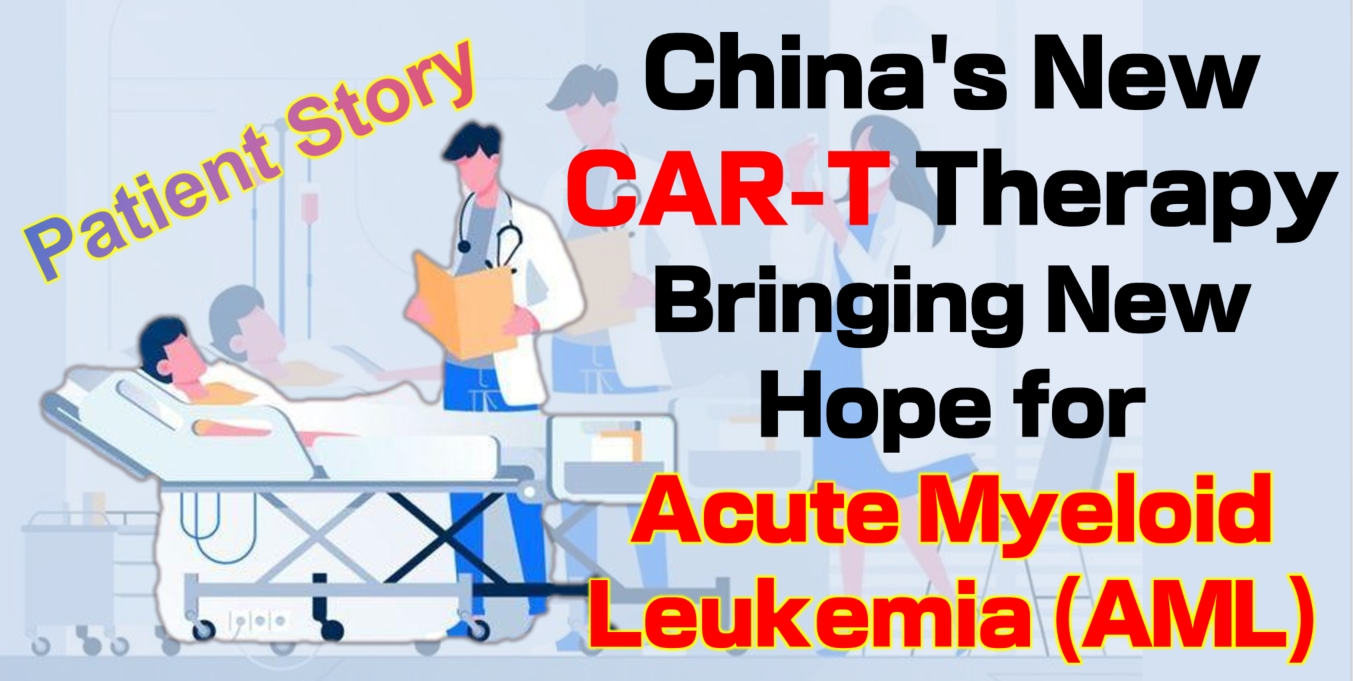
China’s New CAR-T Therapy: Bringing New Hope for Acute Myeloid Leukemia (AML)
**China’s New CAR-T Therapy: Bringing New Hope for Acute Myeloid Leukemia (AML)**

AML
#CLL1CART #AML #Leukemia #CART #CARTtherapy #AcuteMyeloidLeukemia #CLL1 #CD371
In recent years, China’s rise in the field of medical innovation has been remarkable, especially with breakthroughs in cancer and hematologic malignancy treatments that are drawing global attention. Today, we are introducing a cutting-edge treatment from China—donor-derived CLL-1 CAR-T therapy, which offers new hope for adults with relapsed or refractory acute myeloid leukemia (AML). This advanced therapy provides a novel option when conventional treatments prove ineffective.
In AML treatment, the CLL-1 antigen (also known as CD371) is an ideal target, as it is highly expressed on AML leukemic stem cells but not on healthy hematopoietic stem cells. CAR-T therapy targeting CLL-1 can precisely attack AML cells while minimizing effects on healthy immune cells, offering a specific treatment choice with fewer side effects.
### Success Cases of Donor-Derived CLL-1 CAR-T Therapy in China
A 17-year-old Chinese high school student successfully underwent donor-derived CLL-1 CAR-T treatment, providing critical evidence of the therapy’s potential. After being diagnosed with AML, he went through multiple rounds of chemotherapy and autologous stem cell transplantation, but frequent relapses made treatment exceedingly difficult. Due to a lack of sufficient lymphocytes for autologous CAR-T therapy, doctors decided to use donor-derived CLL-1 CAR-T therapy, followed by an allogeneic stem cell transplant.
– **Treatment Process:** After successfully collecting donor lymphocytes and completing preconditioning, the patient received two CAR-T cell infusions. Initially, he experienced mild fever, a common reaction to cytokine release syndrome (CRS), but his condition soon improved significantly.
– **Remarkable Effectiveness:** On the eighth day post-infusion, bone marrow testing showed no cancer cells, lab results returned to normal, and he successfully completed the allogeneic stem cell transplant. During follow-up, his condition remained stable without signs of relapse, and he has since returned to school, resuming a normal life.
### The Breakthrough Significance of China’s CAR-T Therapy in Global AML Treatment
Chinese experts believe that China’s donor-derived CLL-1 CAR-T therapy has significant value in AML treatment, particularly for patients who are unable to undergo conventional CAR-T therapy due to insufficient lymphocytes. Allogeneic stem cell transplantation is an effective AML treatment, but the high relapse rate remains challenging. Introducing CAR-T therapy before transplantation can significantly reduce the risk of relapse, extend patient survival, and improve quality of life. Most patients tolerate the therapy well, with only mild adverse reactions, such as CRS and minor neurotoxicity, and long-term follow-up shows durable effectiveness.
China’s breakthrough in CAR-T therapy for AML provides a new model for leukemia treatment worldwide. China’s donor-derived CLL-1 CAR-T therapy not only brings hope to patients but also offers valuable insights to the global medical community in leukemia treatment. As medical technology advances, Chinese CAR-T therapy will bring benefits to more leukemia patients, helping them achieve long-term survival and improved quality of life.
To assess whether the condition is suitable for CAR-T therapy, you can submit pathology reports, treatment history, and discharge summaries to the Medical Department of Advanced Medicine in China for preliminary evaluation!
WhatsApp: Https://wa.me/+8613717959070
Email: doctor.huang@globecancer.com
#MedicalInnovation #CancerTreatment #HematologicMalignancy #LeukemiaTreatment #ChinaBiotech #CellTherapy #StemCellTransplant #GlobalHealth
Warning: Trying to access array offset on value of type bool in /www/wwwroot/www.medtourcn.com/wp-content/themes/medical-directory/framework/theme/medicaldirectory-image.php on line 78
Warning: Trying to access array offset on value of type bool in /www/wwwroot/www.medtourcn.com/wp-content/themes/medical-directory/framework/theme/medicaldirectory-image.php on line 79
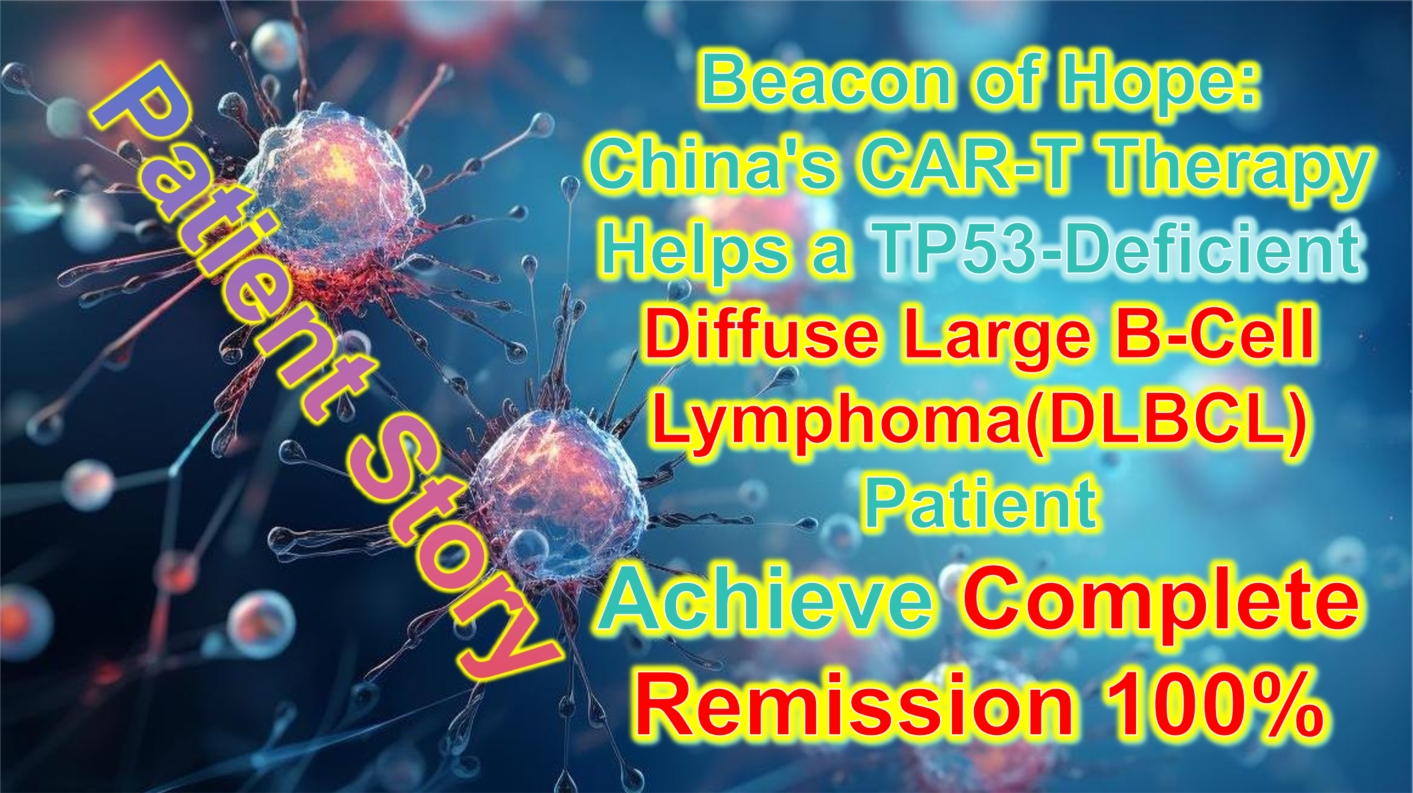
Beacon of Hope: China’s CAR-T Therapy Helps a TP53-Deficient Diffuse Large B-Cell Lymphoma(DLBCL) Patient Achieve Complete Remission
### Beacon of Hope: China’s CAR-T Therapy Helps a TP53-Deficient Diffuse Large B-Cell Lymphoma Patient Achieve Complete Remission

DLBCL
#CAR-T #CancerTreatment #Lymphoma #DLBCL #PrecisionMedicine
In an inspiring treatment case, a 38-year-old Chinese male patient with TP53-deficient Diffuse Large B-cell Lymphoma (DLBCL) achieved complete remission through Chinese CAR-T cell therapy. This remarkable outcome has sparked excitement about the potential and efficacy of China’s CAR-T therapy for treating relapsed and refractory lymphomas.
Patient Treatment Journey
This Chinese patient was diagnosed with non-germinal center subtype DLBCL with TP53 gene deletion in March 2023, and his condition was assessed as high-risk. This genetic factor often complicates prognosis. The patient initially underwent treatments including R-CHOP and R-DA-EPOCH regimens, achieving partial remission (PR). Despite completing autologous stem cell transplantation (ASCT), his disease unfortunately progressed two months later, indicating that ASCT alone was insufficient for sustained remission, and the disease was on the brink of relapse.
Personalized Application of Chinese CAR-T Therapy
In desperation, the patient turned to our Advanced Medicine in China team for assistance. Under the guidance of lymphoma experts experienced in this treatment, the medical team decided to apply Chinese CAR-T cell therapy as a solution. Following a comprehensive assessment, including a detailed analysis of the patient’s medical history and genetic profile, a personalized treatment plan was devised. To further control the disease, the patient received localized retroperitoneal radiotherapy in January 2024, followed by the infusion of Chinese CAR-T cells in February after pretreatment with the FC regimen. Remarkably, just one month after the CAR-T cell infusion, the patient tolerated the therapy well and achieved complete remission (CR). This outcome not only halted disease progression but enabled the patient to return to work and resume a normal life.
Expert Interview with the Advanced Medicine in China Team
The team’s expert highlighted that this case involved relapsed refractory DLBCL, with TP53 deletion adding a higher risk of recurrence. ASCT alone was insufficient for sustained remission, making CAR-T a more effective option. Despite the greater treatment challenges, Chinese CAR-T therapy proved ideal for this high-risk relapsed case. The doctor advised that, when feasible in primary healthcare settings, Chinese CAR-T should be considered as an early intervention option. Research data supports the effectiveness of Chinese CAR-T in second-line therapy compared to standard ASCT.
Overall Advantages of Chinese CAR-T Therapy
This successful case is not isolated; it demonstrates China’s growing expertise and capabilities in CAR-T cell therapy. China has been at the forefront of research and clinical application in this field, committed to improving outcomes for lymphoma patients. The Chinese medical community takes a comprehensive approach to CAR-T therapy, prioritizing personalized medicine and tailoring treatment plans based on each patient’s unique genetic and clinical characteristics. For instance, advanced genetic testing enables doctors to identify specific mutations, such as P53 deletion, and adjust treatment strategies accordingly. When conventional chemotherapy and targeted drugs have limited efficacy, CAR-T cell therapy is increasingly being used as a viable alternative. Furthermore, Chinese hospitals continuously optimize treatment protocols. The pretreatment regimen prior to CAR-T cell infusion is meticulously designed to create an optimal therapeutic environment in the patient’s body. This not only removes barriers for the proliferation and effective functioning of CAR-T cells but also minimizes potential side effects. In this case, the patient’s positive response to the therapy was partly due to the carefully crafted pretreatment regimen.
Global Significance of China’s Experience
As the world seeks innovative cancer treatment solutions, China’s success with CAR-T cell therapy for lymphoma patients provides valuable insights. The combination of advanced medical technology, personalized treatment strategies, and comprehensive patient support offers beneficial lessons for the global fight against lymphoma and other cancers. With ongoing research and accumulating clinical experience, the future of Chinese CAR-T cell therapy holds great promise, bringing hope not only to patients in China but to patients worldwide.
To assess whether the condition is suitable for CAR-T therapy, you can submit pathology reports, treatment history, and discharge summaries to the Medical Department of Advanced Medicine in China for preliminary evaluation!
WhatsApp: Https://wa.me/+8613717959070
Email: doctor.huang@globecancer.com
#ChinaMedicalInnovation #Immunotherapy #GeneTherapy #Oncology #TP53 #CompleteRemission #AdvancedMedicine #GlobalHealth
Warning: Trying to access array offset on value of type bool in /www/wwwroot/www.medtourcn.com/wp-content/themes/medical-directory/framework/theme/medicaldirectory-image.php on line 78
Warning: Trying to access array offset on value of type bool in /www/wwwroot/www.medtourcn.com/wp-content/themes/medical-directory/framework/theme/medicaldirectory-image.php on line 79
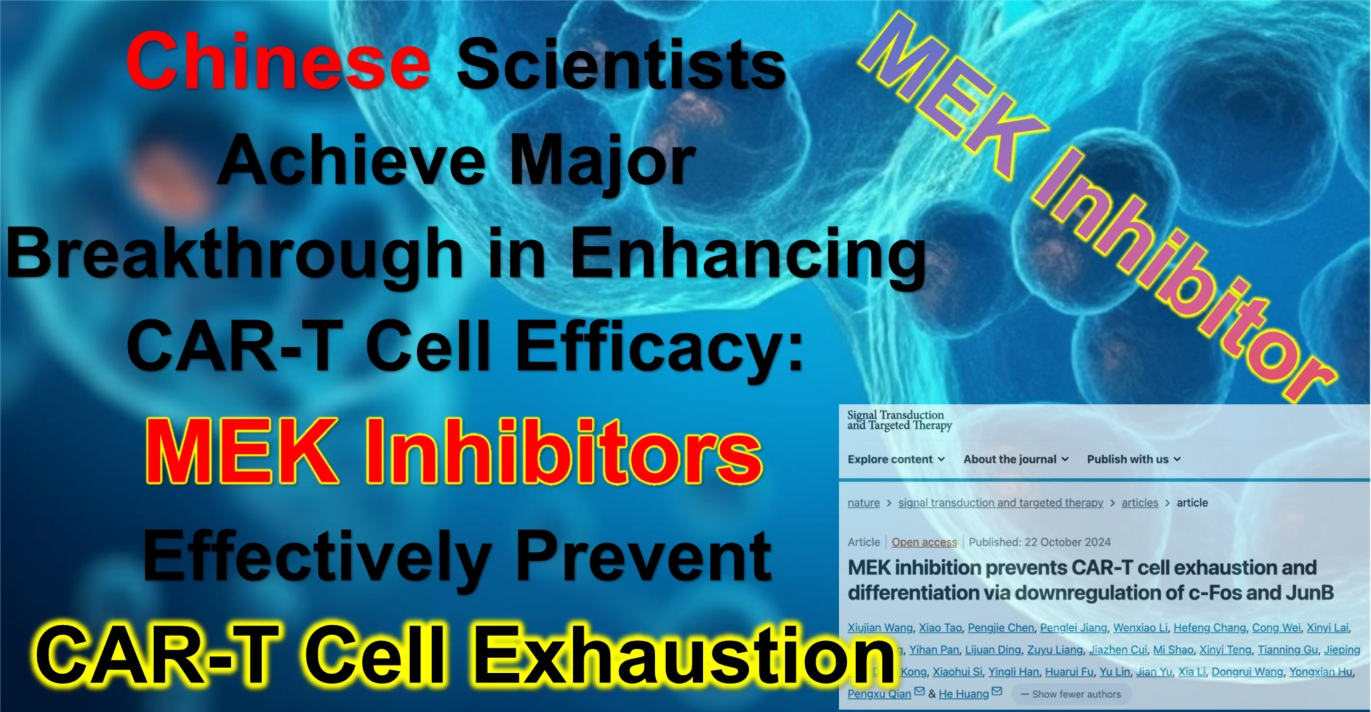
Chinese Scientists Achieve Major Breakthrough in Enhancing CAR-T Cell Efficacy: MEK Inhibitors Effectively Prevent CAR-T Cell Exhaustion
Chinese Scientists Achieve Major Breakthrough in Enhancing CAR-T Cell Efficacy: MEK Inhibitors Effectively Prevent CAR-T Cell Exhaustion

CAR-T
#CARTCellTherapy #MEKInhibitors #CancerResearch #ChineseScientists #CART #MEK
In recent years, CAR-T cell therapy has shown remarkable effectiveness in treating relapsed or refractory B-cell malignancies, particularly in cases where targeted therapies have failed. However, CAR-T therapy’s long-term effectiveness is often limited due to T-cell exhaustion and terminal differentiation, especially for patients with hematological malignancies and solid tumors. Extending the efficacy of CAR-T cells has been a global challenge in the scientific community.
On October 22, 2024, a team of Chinese medical researchers published a groundbreaking study in the prestigious journal *Signal Transduction and Targeted Therapy*, titled “MEK inhibition prevents CAR-T cell exhaustion and differentiation via downregulation of c-Fos and JunB.” This study reveals a new strategy to enhance the efficacy of CAR-T cells by using MEK inhibitors. The research demonstrates that MEK inhibitors (MEKi) can significantly reduce CAR-T cell exhaustion and terminal differentiation by suppressing the expression of c-Fos and JunB. This discovery provides a new approach to improving CAR-T therapy, especially in the context of combined treatments for both hematological malignancies and solid tumors.
MEK1/2 inhibitors have already been widely used in treating tumors with RAS or RAF mutations, playing a crucial role in cancer therapy through immune modulation. The Chinese research team further confirmed that MEKi can effectively reduce the excessive activation and exhaustion of CAR-T cells, extending their persistence and anti-tumor activity in vivo. This study not only highlights the positive impact of MEKi on CAR-T therapy but also lays the groundwork for future combination treatments to further enhance therapeutic efficacy.
The team’s research underscores the importance of the MAPK signaling pathway, particularly the roles of c-Fos and JunB in CAR-T cell function. By inhibiting the expression of these two transcription factors, the researchers successfully prevented premature exhaustion and terminal differentiation in CAR-T cells, maintaining their higher efficacy in fighting tumors.
This discovery expands the potential applications of MEKi in improving CAR-T therapy, especially through combined treatment strategies that promise to significantly improve outcomes for cancer patients. This groundbreaking study not only marks another important contribution from Chinese scientists in the field of CAR-T therapy but also opens new avenues for global cancer treatment.
Through this research, the Chinese medical research team has provided new hope for the clinical application of CAR-T therapy, revealing the potential for multiple combination treatment strategies and bringing more possibilities in the fight against cancer.
To assess whether the condition is suitable for CAR-T therapy, you can submit pathology reports, treatment history, and discharge summaries to the Medical Department of Advanced Medicine in China for preliminary evaluation!
WhatsApp: Https://wa.me/+8613717959070
Email: doctor.huang@globecancer.com
#CancerBreakthrough #Immunotherapy #TargetedTherapy #TCellExhaustion #CARTInnovation #CancerTreatment #MedicalResearch #Oncology #Biotechnology
Warning: Trying to access array offset on value of type bool in /www/wwwroot/www.medtourcn.com/wp-content/themes/medical-directory/framework/theme/medicaldirectory-image.php on line 78
Warning: Trying to access array offset on value of type bool in /www/wwwroot/www.medtourcn.com/wp-content/themes/medical-directory/framework/theme/medicaldirectory-image.php on line 79
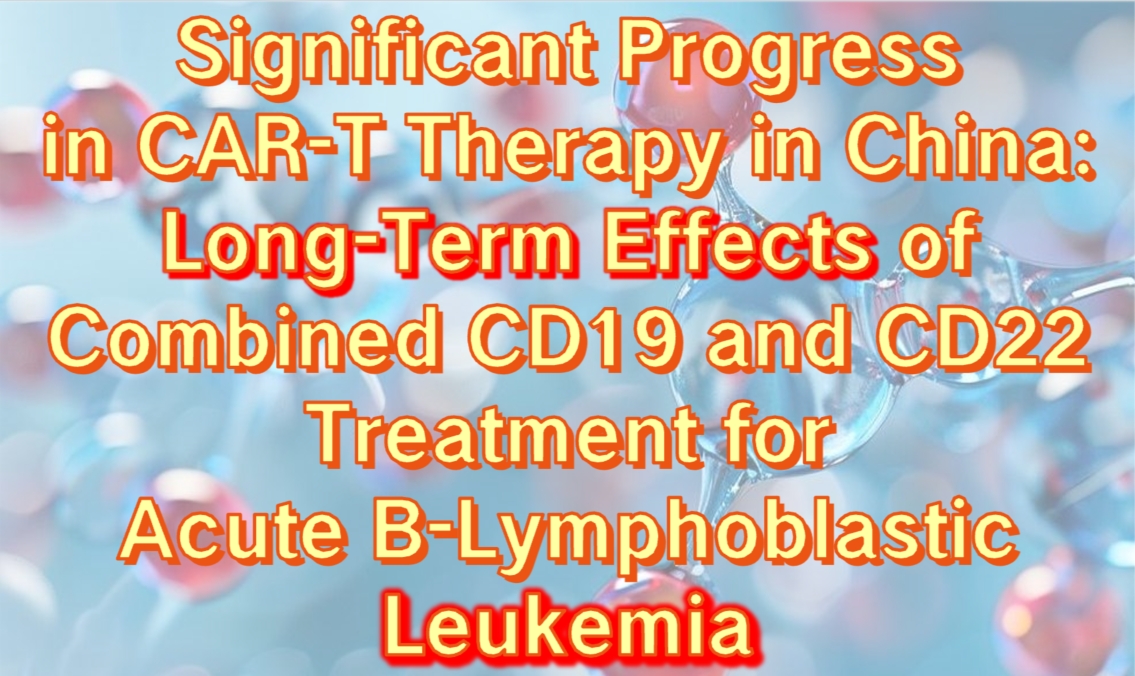
Significant Progress in CAR-T Therapy in China: Long-Term Effects of Combined CD19 and CD22 Treatment for Acute B-Lymphoblastic Leukemia
### Significant Progress in CAR-T Therapy in China: Long-Term Effects of Combined CD19 and CD22 Treatment for Acute B-Lymphoblastic Leukemia

Leukemia
#ALL #CAR-Ttherapy #Leukemia #CancerResearch #B_ALL #LeukemiaTreatment
Recently, a Chinese medical team published a notable study titled “Five-year outcome of CD19 combined with CD22 CAR-T cell therapy in B-ALL patients relapsed after allo-transplantation.” The research highlights the long-term efficacy of combined CD19 and CD22 CAR-T cell therapy in patients with relapsed acute B-lymphoblastic leukemia (B-ALL) after allogeneic hematopoietic stem cell transplantation (allo-HCT). This breakthrough has not only brought new hope to B-ALL patients but also attracted significant global attention.
**Background and Significance**
Acute B-lymphoblastic leukemia is a hematologic malignancy with poor prognosis, especially for patients who experience relapse after allo-HCT, where survival rates are significantly reduced. CAR-T cell therapy in China has shown increasingly positive results in treating B-ALL, particularly in targeting the CD19 antigen. However, the effects of targeting the CD22 antigen and its potential in combination with CD19 therapy are still under deeper investigation.
**Study Design and Methodology**
Based on a previous phase I clinical trial, this study involved a follow-up of 27 patients who had received CD19 CAR-T treatment. To comprehensively assess the treatment’s efficacy, the study also included three additional patients who experienced relapse with minimal residual disease (MRD) in the bone marrow. Although these patients did not meet the initial trial’s criteria, they received combined CD19 and CD22 CAR-T cell therapy under the same protocol. The CAR-T cells used in this study were second-generation designs created via lentiviral vector transfection.
**Study Results**
After a 5-year follow-up, the Chinese research team found that combined CD19 and CD22 therapy significantly improved patients’ long-term survival rates. Among the 30 patients who completed the combined therapy, the median follow-up time was 64.4 months. After two complete treatment cycles, patients maintained sustained remission. Survival analysis showed that the 3-year and 5-year overall survival rates reached 79% and 75%, respectively, with event-free survival rates of 54% and 50%. These results indicate that combined CD19 and CD22 CAR-T cell therapy offers substantial long-term efficacy for relapsed B-ALL patients.
**Conclusions and Future Outlook**
This study not only validates the potential of CAR-T cell therapy in hematologic malignancies but also provides new therapeutic insights for clinical practice. The combination of CD19 and CD22 holds promise for offering a more effective treatment option for B-ALL patients who relapse after allo-HCT, significantly improving their long-term survival rates.
As research in CAR-T cell therapy deepens, we may see more targeted approaches and optimized treatment protocols emerge. China’s active exploration and innovation in this field bring renewed hope to hematologic cancer patients worldwide, with the expectation that CAR-T therapy will further improve survival rates and quality of life for B-ALL patients in the near future.
To assess whether the condition is suitable for CAR-T therapy, you can submit pathology reports, treatment history, and discharge summaries to the Medical Department of Advanced Medicine in China for preliminary evaluation!
WhatsApp: Https://wa.me/+8613717959070
Email: doctor.huang@globecancer.com
#Immunotherapy #CD19CD22Combo #StemCellTransplant #ChinaMedicalResearch #Hematology #CancerBreakthrough #LongTermSurvival #BloodCancer
Warning: Trying to access array offset on value of type bool in /www/wwwroot/www.medtourcn.com/wp-content/themes/medical-directory/framework/theme/medicaldirectory-image.php on line 78
Warning: Trying to access array offset on value of type bool in /www/wwwroot/www.medtourcn.com/wp-content/themes/medical-directory/framework/theme/medicaldirectory-image.php on line 79
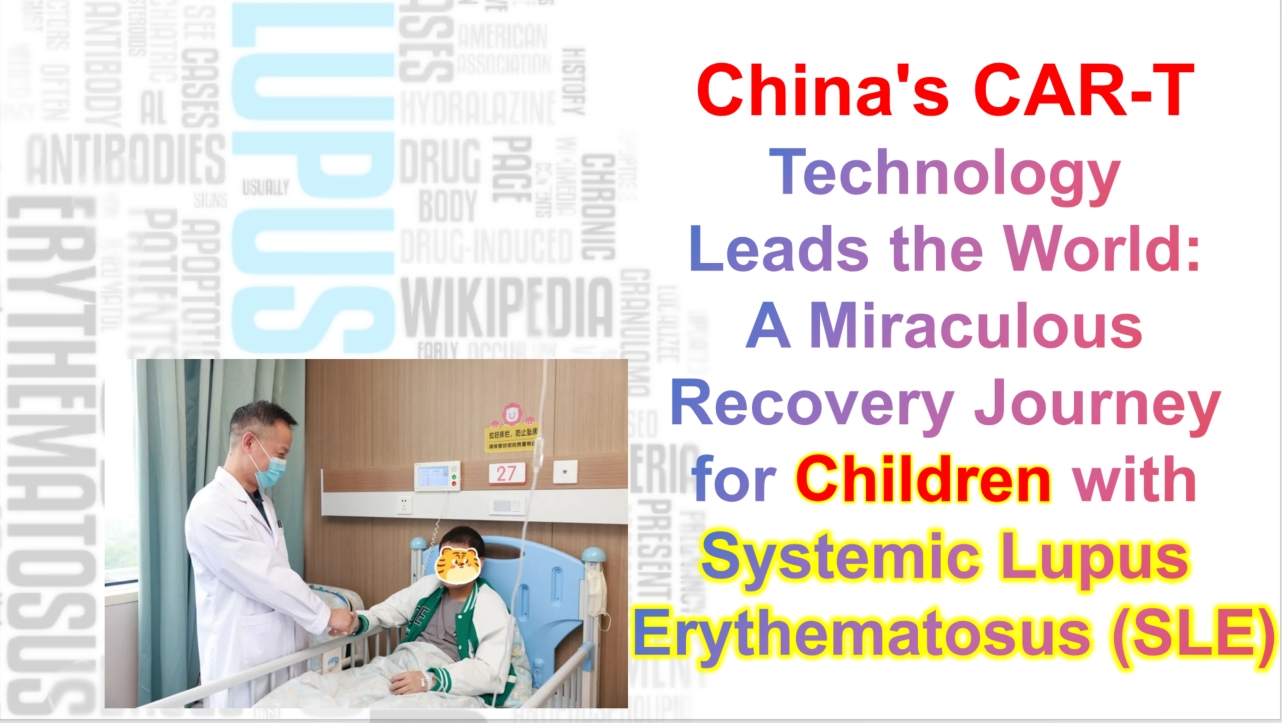
China’s CAR-T Technology Leads the World: A Miraculous Recovery Journey for Children with systemic lupus erythematosus (SLE)
**China’s CAR-T Technology Leads the World: A Miraculous Recovery Journey for Children with systemic lupus erythematosus (SLE)**

LUPUS
#SLE #lupus #systemiclupuserythematosus #CAR_Ttherapy #CancerSurvivor #ChineseHealthcare#PatientStory
In the field of medicine, the boundary between science and miracles is often blurred. This October, news from Zhejiang, China, shocked the world: 20 children suffering from refractory systemic lupus erythematosus (SLE) successfully discontinued the use of steroids and all immunosuppressants after receiving CAR-T cell therapy.
This global breakthrough not only brings hope to patients and their families but also demonstrates the immense potential of CAR-T therapy in the treatment of autoimmune diseases.
### Immune System Reset, New Life Begins
Systemic lupus erythematosus (SLE) is a complex autoimmune disease that many patients struggle to control despite long-term reliance on medications. This clinical trial, led by a team of renowned Chinese medical experts, marks the first time autologous CD19-targeted CAR-T cells have been applied to treat pediatric SLE patients. In just seven months, the symptoms of all 20 children improved significantly, and their quality of life greatly increased.
These children ranged in age from 6 to 19 years, with disease durations varying from four months to 11 years. Prior to receiving CAR-T treatment, they had been on an average of more than five different medications, with some taking as many as nine, yet the results were less than ideal. The introduction of CAR-T therapy became their last hope.
Although CAR-T therapy has already seen widespread application in the field of hematologic malignancies, this treatment for pediatric SLE represents a new frontier for CAR-T technology in autoimmune disease treatment, paving the way for innovative medical exploration.
### Clinical Data: Miracles in Reality
Among the 20 children, many showed remarkable recovery. For example, a 12-year-old girl from Shanghai, who had experienced recurrent lupus flare-ups, with a “butterfly rash” covering her face and massive proteinuria, saw a dramatic improvement after receiving CAR-T therapy. Within six months, she stopped all medications, her proteinuria decreased significantly, and her facial rash completely disappeared. By September, she had returned to school and was living almost normally.
Another 15-year-old girl from Shandong, despite having been diagnosed only two years prior, had progressed rapidly to kidney failure, requiring dialysis. After treatment, her blood creatinine level dropped from 700 μmol/L to 170 μmol/L, and her urine output increased from 50ml to 1000ml, allowing her to fully stop dialysis.
Moreover, all 20 children successfully discontinued steroids and immunosuppressants, and some patients’ disease activity scores dropped to zero. This means their immune systems have been reset, providing long-term control and, in some cases, a complete cure.
### Safety and Side Effects of CAR-T Therapy
Every revolutionary treatment carries risks, but the safety of China’s CAR-T therapy in this trial has been encouraging. CAR-T therapy works by genetically modifying T cells to recognize and attack specific target cells. Some patients experienced mild side effects, such as fever, nausea, and fatigue. Among the 20 children, only three exhibited mild neurological symptoms, which quickly improved with symptomatic treatment.
Research shows that CAR-T treatment in pediatric SLE patients comes with relatively mild side effects, and most patients did not experience any severe adverse reactions. This makes the future of CAR-T therapy in treating refractory lupus even more promising. This technology not only delivers significant therapeutic effects but also restores hope for a better future for these children.
### A Forward-Looking Treatment: From SLE to Other Diseases
Following the success of these 20 SLE cases, the research team plans to extend the application of China’s CAR-T technology to other autoimmune diseases, such as ANCA-associated vasculitis (AAV) and multidrug-resistant steroid-resistant nephrotic syndrome (MDR-SRNS). This means that in the future, more patients will have the opportunity to benefit from this revolutionary therapy.
🎉🎉To assess whether the condition is suitable for CAR-T therapy, you can submit pathology reports, treatment history, and discharge summaries to the Medical Department of <Advanced Medicine in China> for preliminary evaluation!
WhatsApp: Https://wa.me/+8613717959070
Email: doctor.huang@globecancer.com
#CancerTreatment #Immunotherapy #MedicalBreakthrough #AdvancedMedicine #HealthRecovery
Warning: Trying to access array offset on value of type bool in /www/wwwroot/www.medtourcn.com/wp-content/themes/medical-directory/framework/theme/medicaldirectory-image.php on line 78
Warning: Trying to access array offset on value of type bool in /www/wwwroot/www.medtourcn.com/wp-content/themes/medical-directory/framework/theme/medicaldirectory-image.php on line 79

Another New CAR-T Therapy in China is Fast-Tracking Approval, Targeting Pediatric Acute Lymphoblastic Leukemia(ALL) with a 100% Response Rate!
Another New CAR-T Therapy in China is Fast-Tracking Approval, Targeting Pediatric Acute Lymphoblastic Leukemia with a 100% Response Rate!

ALL
In recent years, CAR-T cell therapies from China have garnered global attention in the fight against cancer, and now another CAR-T product is about to hit the market. Priscabtagene Autoleucel Injection (pCAR-19B), developed by China’s Precision Biotech, is specifically designed for relapsed or refractory B-cell acute lymphoblastic leukemia (ALL) and is currently under priority review for approval. It is poised to become China’s first CAR-T therapy specifically tailored for children and adolescents with acute leukemia.
This groundbreaking therapy has shown remarkable efficacy, achieving a 100% overall response rate in early clinical trials. For patients who no longer respond to conventional treatments, Priscabtagene Autoleucel offers a new lifeline. The therapy has demonstrated superior safety and efficacy in clinical settings, thanks to gene optimization and advanced vector systems that reduce side effects while enhancing effectiveness.
Currently, pCAR-19B has entered Phase II clinical trials, expanding its scope beyond children to include adult patients with relapsed leukemia. It is also being researched for the treatment of other malignant lymphomas, such as diffuse large B-cell lymphoma and follicular lymphoma. This signifies the vast potential of CAR-T therapies in China, promising more effective treatment options for blood cancer patients both domestically and globally.
Precision Biotech’s CAR-T therapy is expected to gain approval soon, contributing to global medical innovation while bringing new hope to countless patients.
To assess whether the condition is suitable for CAR-T therapy, you can submit pathology reports, treatment history, and discharge summaries to the Medical Department of Advanced Medicine in China for preliminary evaluation!
WhatsApp: Https://wa.me/+8613717959070
Email: doctor.huang@globecancer.com
Warning: Trying to access array offset on value of type bool in /www/wwwroot/www.medtourcn.com/wp-content/themes/medical-directory/framework/theme/medicaldirectory-image.php on line 78
Warning: Trying to access array offset on value of type bool in /www/wwwroot/www.medtourcn.com/wp-content/themes/medical-directory/framework/theme/medicaldirectory-image.php on line 79

How to Choose Among Similar CAR-T Therapies?
**How to Choose Among Similar CAR-T Therapies?**
Currently, there are multiple CAR-T products targeting the same antigen available on the market, which can make it difficult for patients to decide which one to choose.
Experts recommend selecting a therapy based on the treatment target. It is generally advisable to prioritize approved products, as they have been validated, providing better assurance of safety and efficacy. For example, CD19-targeting CAR-T products are typically preferred over CD22-targeting ones, and BCMA-targeting therapies are favored over GPRC5D-targeting ones.
Additionally, it’s important to consider the origin of the CAR-T cells (such as human-derived vs. mouse-derived) and the costimulatory signals used (e.g., 4-1BB vs. CD28). Different conditions may also influence the choice; for instance, lymphoma patients may be more suitable for CD28, while those with acute leukemia might benefit more from 4-1BB.
In the end, patients are advised to make an informed decision based on their medical history and the guidance of their doctors.

 To assess whether the condition is suitable for CAR-T therapy, you can submit pathology reports, treatment history, and discharge summaries to the Medical Department of Advanced Medicine in China for preliminary evaluation!
To assess whether the condition is suitable for CAR-T therapy, you can submit pathology reports, treatment history, and discharge summaries to the Medical Department of Advanced Medicine in China for preliminary evaluation!
WhatsApp: Https://wa.me/+8613717959070
Email: doctor.huang@globecancer.com
Warning: Trying to access array offset on value of type bool in /www/wwwroot/www.medtourcn.com/wp-content/themes/medical-directory/framework/theme/medicaldirectory-image.php on line 78
Warning: Trying to access array offset on value of type bool in /www/wwwroot/www.medtourcn.com/wp-content/themes/medical-directory/framework/theme/medicaldirectory-image.php on line 79
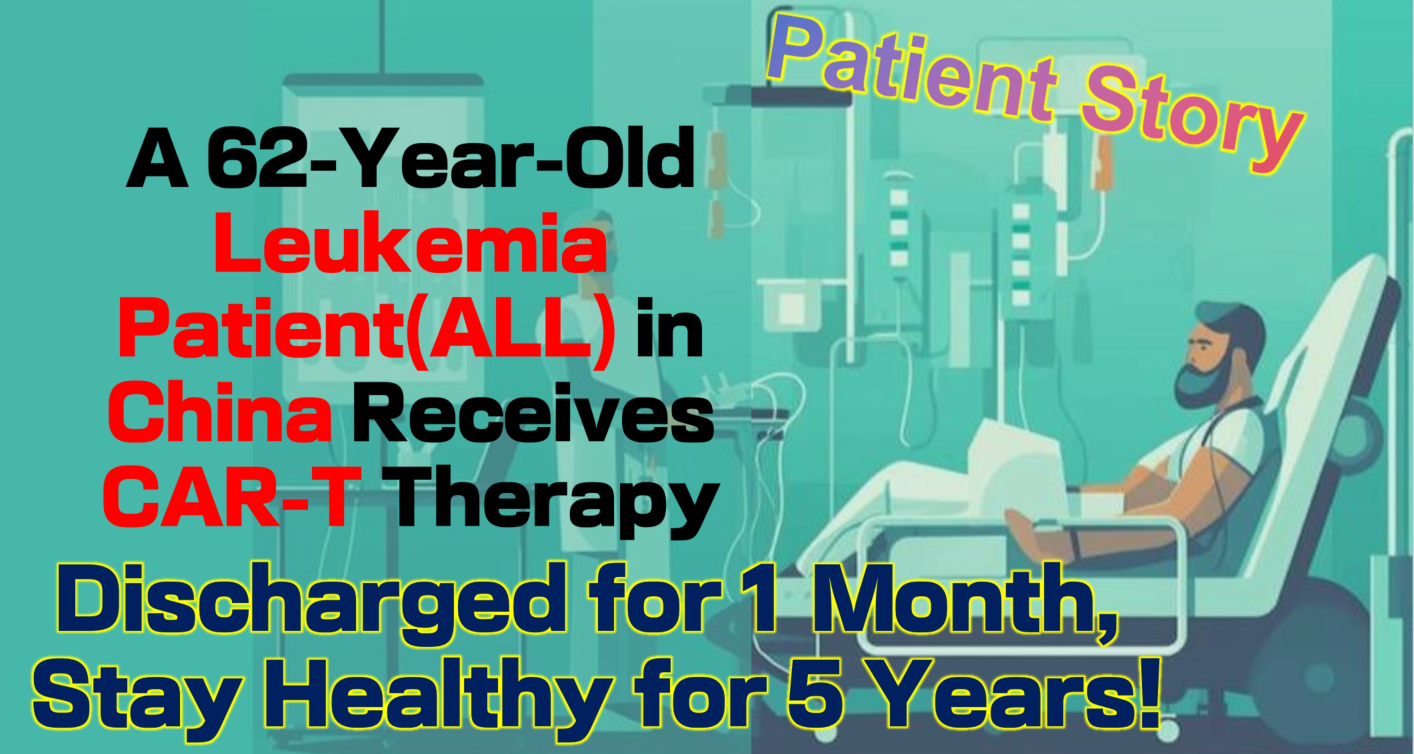
A 62-Year-Old Leukemia Patient in China Receives CAR-T Therapy, Discharged After One Month, and Still Healthy After Five Years!
A 62-Year-Old Leukemia Patient in China Receives CAR-T Therapy, Discharged After One Month, and Still Healthy After Five Years!

Patient Story
#Leukemia #CAR_Therapy #CancerSurvivor #ChineseHealthcare#PatientStory
Acute lymphoblastic leukemia (ALL) is a type of leukemia that originates from B or T lymphoid progenitor cells. Leukemia cells proliferate abnormally in the bone marrow, suppressing normal hematopoiesis, leading to anemia, thrombocytopenia, and neutropenia.
Patient Story:
In 2019, 62-year-old Mr. Ke from China sought treatment at multiple hospitals due to weakness and fatigue, but no diagnosis was made. After being transferred to the hematology department and undergoing a bone marrow biopsy, he was finally diagnosed with acute lymphoblastic leukemia (ALL). Despite undergoing numerous chemotherapy sessions, his condition worsened, and his health deteriorated further.
In this challenging situation, with the help of the Advanced Medicine In China team, Mr. Ke transferred to a renowned hospital in Guangdong, China, to try the advanced CAR-T cell therapy. This was a bold decision after two years of failed chemotherapy attempts.
CAR-T Therapy: A New Hope for Leukemia Treatment
CAR-T cell therapy is a groundbreaking treatment that modifies a patient’s T cells to recognize and attack cancer cells. In early 2019, Mr. Ke received CD19 CAR-T therapy combined with a tumor DC vaccine. His T cells were reprogrammed and reinfused to fight leukemia cells.
The treatment process wasn’t easy. Although initially planned for discharge within days, he experienced high fever and lung infections during hospitalization. However, with timely intervention from the Chinese medical team, these complications were effectively managed. Eventually, Mr. Ke was discharged, and follow-up tests confirmed his complete remission.
Surpassing Traditional Therapies and Embracing a New Life
For ALL, chemotherapy is more effective in children, but its efficacy is often limited in adults, especially high-risk patients. Mr. Ke recalls, “After countless failed chemotherapy sessions, I was almost hopeless. Fortunately, CAR-T therapy worked like a miracle.”
Today, five years later, Mr. Ke remains in good health, fully recovered. Chinese hematology experts noted, “For patients who receive early CAR-T treatment, the five-year survival rate now exceeds 70%. We hope that more patients can benefit from this advanced therapy, regain their health, and enjoy life again.”
China’s advancements in CAR-T cell therapy have garnered global attention, with many international patients seeking this cutting-edge treatment. Mr. Ke’s recovery story brings hope to countless patients and highlights China’s innovative achievements in immunotherapy.
🎉🎉To assess whether the condition is suitable for CAR-T therapy, you can submit pathology reports, treatment history, and discharge summaries to the Medical Department of <Advanced Medicine in China> for preliminary evaluation!
WhatsApp: Https://wa.me/+8613717959070
Email: doctor.huang@globecancer.com
#CancerTreatment #Immunotherapy #MedicalBreakthrough #AdvancedMedicine #HealthRecovery
Warning: Trying to access array offset on value of type bool in /www/wwwroot/www.medtourcn.com/wp-content/themes/medical-directory/framework/theme/medicaldirectory-image.php on line 78
Warning: Trying to access array offset on value of type bool in /www/wwwroot/www.medtourcn.com/wp-content/themes/medical-directory/framework/theme/medicaldirectory-image.php on line 79
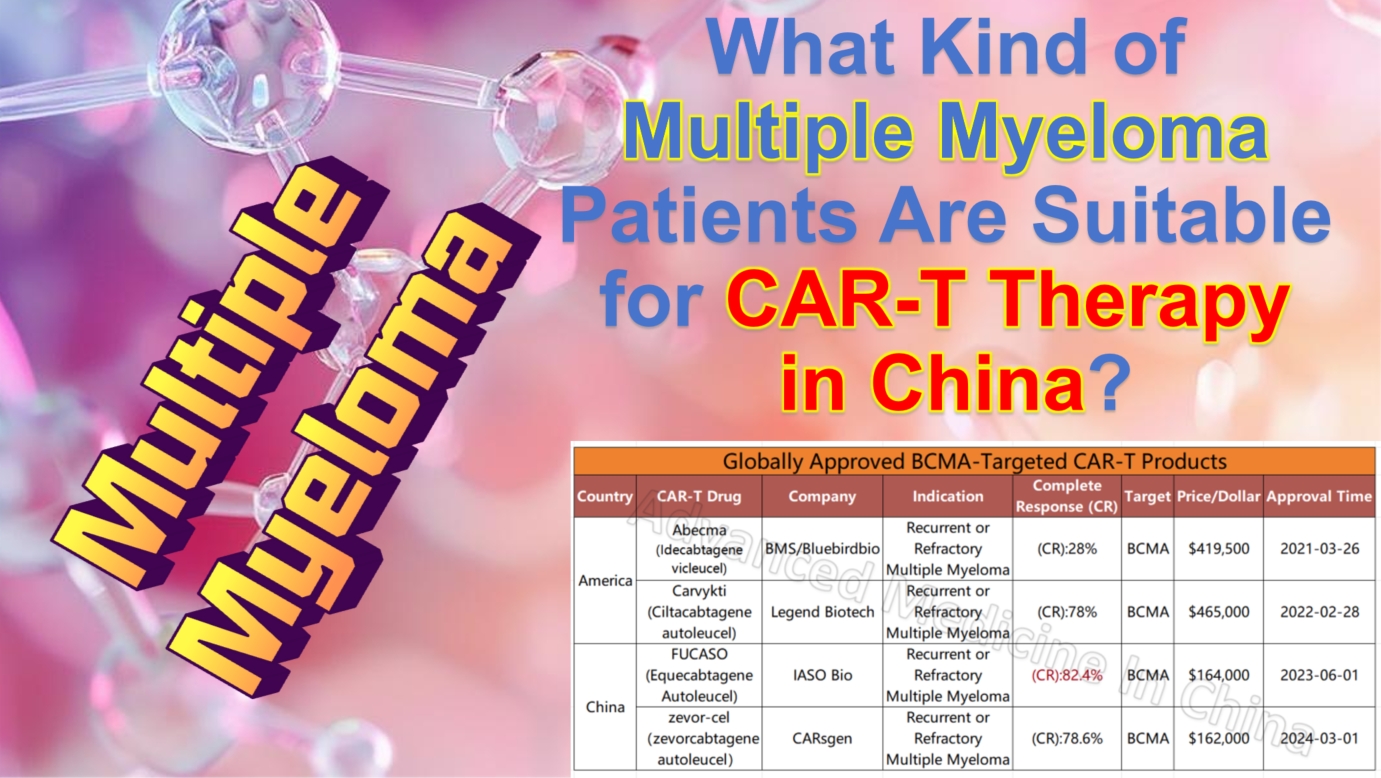
What Kind of Multiple Myeloma Patients Are Suitable for CAR-T Therapy in China?
# What Kind of Multiple Myeloma Patients Are Suitable for CAR-T Therapy in China?

Multiple Myeloma
#MultipleMyeloma #CAR_Therapy #MM #CART #RRMM #Hematology
**Multiple Myeloma** (MM) is a malignant hematological disease that affects plasma cells. In recent years, various drugs and treatment methods, such as proteasome inhibitors, immunomodulatory drugs, and autologous stem cell transplantation, have significantly improved the prognosis of multiple myeloma patients. However, a considerable number of patients still experience relapses and refractory disease. For these patients, CAR-T cell therapy is emerging as a groundbreaking and effective treatment option.
China has made remarkable progress in CAR-T therapy technology in recent years, becoming a global leader in the field of hematological diseases. This has attracted patients worldwide to seek this advanced treatment. So, which multiple myeloma patients are suitable to receive CAR-T treatment in China?
## 1. **Indications: Preferred Choice for Drug-Resistant/Relapsed/Refractory Multiple Myeloma Patients**
CAR-T therapy is typically recommended for multiple myeloma patients who have developed resistance to standard treatments (such as proteasome inhibitors, immunomodulatory drugs, and monoclonal antibodies) and are in their third line of treatment or beyond. In China, CAR-T therapy has broader indications and better efficacy.
### Suitable Patient Types:
-
Relapsed or refractory multiple myeloma patients, typically those who have undergone at least second-line treatments.
-
Patients with high-risk genetic characteristics, such as certain mutations (e.g., 17p deletion, t(4;14) translocation).
-
Patients unable to tolerate traditional treatments, including chemotherapy, other targeted therapies, stem cell transplantation, or immunomodulatory treatments, due to poor tolerance or severe side effects.
-
Patients who are BCMA-positive.
-
Patients whose disease continues to progress despite other treatments, especially chemotherapy.
-
Patients who are ineligible for stem cell transplantation.
-
Patients with severe symptoms not responsive to conventional treatments, such as bone pain, anemia, hypercalcemia, and kidney damage.
-
High tumor burden patients—experts generally reduce the tumor burden first before administering CAR-T therapy, often through bridging or sequential treatments.
Among the four global CAR-T products targeting the BCMA marker in multiple myeloma, two Chinese products stand out for their efficacy and affordability. The most effective product currently is IASO Bio’s FUCASO (Equecabtagene Autoleucel), with a complete response (CR) rate of 82.4%.
## 2. **Patients in Good Physical Condition**
CAR-T therapy is essentially a powerful immunotherapy. Although it has remarkable efficacy, it also carries some risks of side effects, including cytokine release syndrome (CRS) and neurotoxic reactions. China’s CAR-T treatment system is highly developed, with established treatment plans and consensus. The country has extensive experience in managing CRS, neurotoxins, and side effects, keeping the risks very low. Moreover, the expert doctors at Advanced Medicine in China have substantial experience in managing these risks. Nonetheless, patients are typically required to have stable physical health to withstand the risks associated with the treatment.
– Overall good physical function; patients with heart, lung, liver, or kidney dysfunction may require a secondary evaluation by an expert team.
– Patients need to score 0-1 on the ECOG performance status scale, indicating that they are capable of daily activities and self-care.
## 3. **Patients with Financial and Time Support for CAR-T Therapy**
CAR-T therapy’s high cost and complex manufacturing process require patients and their families to have financial support. CAR-T therapy in China is significantly more affordable than in Western countries. While CAR-T treatments in the U.S. may cost $600,000 to $700,000, China’s approved CAR-T treatments cost around $100,000, about one-fifth to one-seventh of U.S. prices. Nevertheless, it remains a high-cost treatment, so patients need to be fully aware of the expenses involved.
China has invested heavily in CAR-T research in recent years. Many top hospitals and research institutions conduct related clinical trials. China accounts for over 50% of global CAR-T clinical trials. If a patient qualifies for a clinical trial, participating in it could be a more economical option, offering access to the latest CAR-T therapies, sometimes costing only tens of thousands of dollars or even free.
The CAR-T treatment process is relatively long. It involves collecting T cells, modifying them, re-injecting them, and close monitoring, requiring the patient to have enough time and patience to complete the entire process. The fastest known case took two weeks to complete all steps and discharge with complete response (CR), but generally, the process takes about four weeks or longer, depending on the patient’s condition.
For patients who can afford the treatment and have the time to complete it, CAR-T therapy in China is undoubtedly an attractive option.
## Conclusion
China’s leading position in CAR-T cell therapy technology and lower treatment costs make it a popular destination for multiple myeloma patients worldwide. It offers new hope for relapsed or refractory multiple myeloma patients. By working with experienced medical teams, patients can receive more personalized treatment plans and benefit from the rapid development of CAR-T therapy globally.
🎉🎉To assess whether the condition is suitable for CAR-T therapy, you can submit pathology reports, treatment history, and discharge summaries to the Medical Department of <Advanced Medicine in China> for preliminary evaluation!
WhatsApp: Https://wa.me/+8613717959070
Email: doctor.huang@globecancer.com
#CancerTreatment #ChinaMedicalInnovation #Immunotherapy #MyelomaTreatment #AdvancedMedicine #RelapsedMyeloma #CancerResearch
Warning: Trying to access array offset on value of type bool in /www/wwwroot/www.medtourcn.com/wp-content/themes/medical-directory/framework/theme/medicaldirectory-image.php on line 78
Warning: Trying to access array offset on value of type bool in /www/wwwroot/www.medtourcn.com/wp-content/themes/medical-directory/framework/theme/medicaldirectory-image.php on line 79

Complete Remission In Just Two Months! China’s CAR-T Therapy Brings New Hope For Lymphoma (DLBCL) Patients!
Complete Remission In Just Two Months! China’s CAR-T Therapy Brings New Hope For Lymphoma (DLBCL) Patients!

DLBCL
